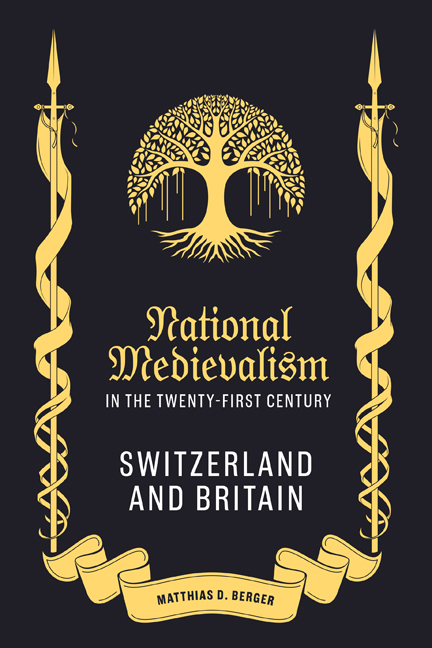Book contents
- Frontmatter
- Dedication
- Contents
- List of Illustrations
- Acknowledgements
- Author’s Note
- List of Abbreviations
- Introduction
- 1 Constructing Continuity: Four Nations Imagine Their Beginnings
- Part I The Politics of Autochthony
- 2 For Freedom Alone: The Scottish Independence Referendum
- 3 2016 and All That: Brexit
- 4 Freiheit statt Vögte: The Swiss National-Conservatives
- Part II The Others of National Medievalism
- 5 Masculine Middle Ages: Gender
- 6 In Strange Lands: Race, Ethnicity, Immigration
- Conclusion: The Demands of the Past
- Afterword: National Medievalism in the Age of COVID-19
- Bibliography
- Index
- Medievalism
4 - Freiheit statt Vögte: The Swiss National-Conservatives
Published online by Cambridge University Press: 17 December 2023
- Frontmatter
- Dedication
- Contents
- List of Illustrations
- Acknowledgements
- Author’s Note
- List of Abbreviations
- Introduction
- 1 Constructing Continuity: Four Nations Imagine Their Beginnings
- Part I The Politics of Autochthony
- 2 For Freedom Alone: The Scottish Independence Referendum
- 3 2016 and All That: Brexit
- 4 Freiheit statt Vögte: The Swiss National-Conservatives
- Part II The Others of National Medievalism
- 5 Masculine Middle Ages: Gender
- 6 In Strange Lands: Race, Ethnicity, Immigration
- Conclusion: The Demands of the Past
- Afterword: National Medievalism in the Age of COVID-19
- Bibliography
- Index
- Medievalism
Summary
When they take away a nation's memory, it loses its character, its identity, becomes manipulable and loses its autonomy, just like people do.
TO A DEGREE unparalleled in either Scotland or England, the medievalist repertoire of Switzerland has been co-opted, at the national level, by the representatives of a narrowly circumscribed ideological spectrum.2 Rallied around the SVP, the strand of conservatism commonly labelled ‘national-conservatism’ currently has a strong hold on medievalist imagery. This imagery is derived from the Swiss liberation tradition, a cluster of national medievalisms which centre on the mythical medieval struggle against, and eventual vanquishing of, the nobility. The protagonists are the hardy Swiss peasants, a people uniquely attuned to freedom and (in later versions) committed to political neutrality. Twenty-first-century national- conservative medievalism maintains what is broadly the nineteenth-century narrative of Switzerland as a ‘special case’ (Sonderfall) in Europe. More specifically, it draws on a prominent offshoot of that narrative, the mid-twentieth-century ‘Spiritual Defence of the Homeland’ (Geistige Landesverteidigung).
In contrast, the use of medievalist imagery by other political camps is rare on the national stage. In the face of the national-conservative claim, centrist and, even more so, left-wing political actors now hesitate to take up medievalist themes and imagery, and struggle to make an impact when they do. A partial exception to this is the figure of Wilhelm Tell, which has retained a greater ability to accommodate diverse political ideologies. Such counter-medievalisms to the national-conservative variants do not, however, exhibit a high level of independence but, rather, reinforce national-conservative dominance by ironising what is treated as the metaphorical property of the SVP.
Since the national-conservative movement has generated one of the most visible strands of national medievalism tout court in present-day Switzerland, any discussion of contemporary political medievalism must revisit that movement's rise to prominence at the turn of the century. I begin by sketching the way it has appropriated the Spiritual Defence of the Homeland. Officially lasting from the 1930s to the 1960s, the Spiritual Defence of the Homeland was an influential political and cultural movement meant to project Swiss independence and distinctiveness of values in the face of fascist and communist totalitarianisms in Europe. Thanks to its refusal to define clearly what these values were, it was initially a broad church.
- Type
- Chapter
- Information
- National Medievalism in the Twenty-First CenturySwitzerland and Britain, pp. 112 - 138Publisher: Boydell & BrewerPrint publication year: 2023



